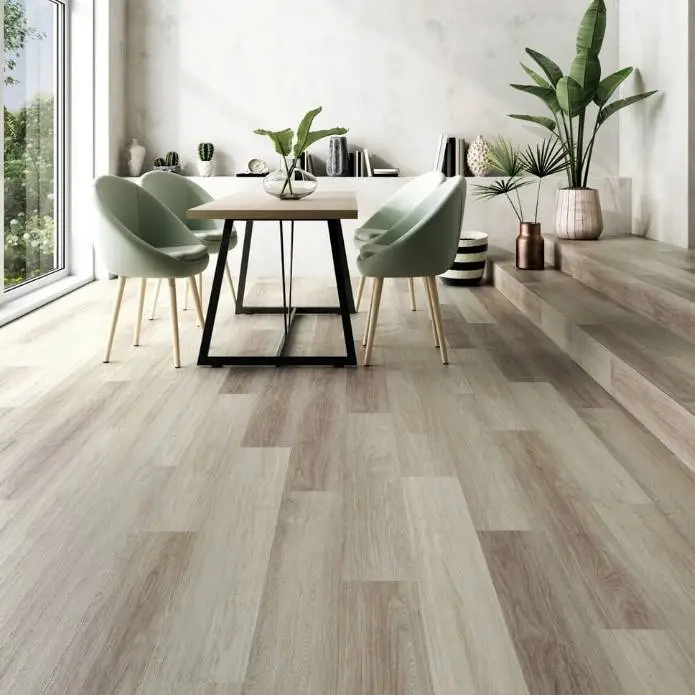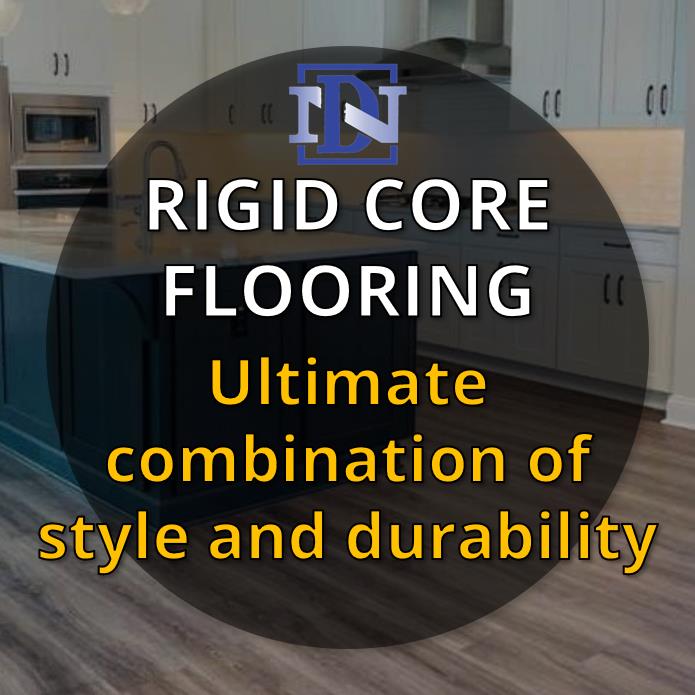What Is Resilient Flooring?
Resilient flooring generally refers to flooring that are made from materials that can be stretched, bent, or compressed and has a property to revert back to their original form after reprocessing. Flooring made from these materials can endure high foot traffic, bear the weight of furniture, and other impacts without damage to the flooring itself. With such durability performances, resilient flooring are considered a flooring option that are easy to maintain, long-lasting, and flexible.

Requires Maintenance a strong feature for Resilient Flooring
Low maintenance is a distinctive feature for resilient flooring products. Therefore it is ideal for both homeowners or commercial properties to seeking floors that are simple to clean and need little upkeep. These hardwood flooring alternatives can help save both time and money, making them highly favorable for residential and commercial spaces.
Long-lasting feature for Resilient Flooring
Resilient flooring is build with long-lasting performance. It can withstands heavy foot traffic without showing signs of wear and dents, which makes it essential for both home hallways and commercial retail space applications. In certain applications, these flooring can endure for more than 50 years. Additionally, they are a great option for daycare centers and pet-friendly homes since spills can be easily cleaned up without causing stains.
What Advantages Does Resilient Flooring Offer?
What are the advantages of selecting resilient flooring instead of conventional options? Besides their durability, and long lasting features, resilient floors are budget-friendly and available in endless designs.
Resilient Flooring is Cost-Effective
For numerous individuals, possessing natural stone or hardwood flooring is seen as luxurious. Nevertheless, if you prioritize convenience and longevity with a limited budget, resilient floorings are a more suitable choice. Not only they endure for many years but are significantly more affordable than non-resilient options and demand less maintenance, making them highly economical both costs and maintenance wise.
Timeless Designs
Just because you found a fantastic bargain doesn’t mean your flooring has to appear inexpensive. There are countless resilient flooring collections available that exude elegance, modernity, and a premium look. Many individuals opt for this type of flooring precisely because of the wide variety of choices, enabling them to select the ideal pattern or color that complements their desired decor.
Various Types of Resilient Flooring
There is a common misconception that resilient flooring exclusively refers to vinyl flooring. In reality, there are various types of floors classified as resilient, each providing its own advantages.
So how to decide which one is better or more preferable? It all depends on the requirement and your preference. While certain options are ideal for residential spaces, others are more effective in commercial environments.
- Semi Rigid Luxury Vinyl Tile
- Rigid Core SPC Luxury VInyl Flooring
- Vinyl Sheet Flooring (Homogeneous/Heterogeneous)
- Linoleum Flooring
- Cork Flooring
- Rubber Flooring
- Vinyl Composition Tile
Semi Rigid Luxury Vinyl Tile
The rise in popularity of semi rigid luxury vinyl tile (LVT) can be attributed to its exceptional design options. LVT allows you to enjoy the natural aesthetics and unique textures of wood and stone without putting a strain on your family’s finances. Your visitors might not even notice the difference between the LVT you select and pricier flooring options such as hardwood, stone, or ceramic tiles. Additionally, LVT is waterproof, pet-friendly, and extremely durable, which helps minimize maintenance costs over time. LVT also contributes to waste reduction through its modular installation, enabling you to easily swap out individual tiles or planks as needed, rather than having to replace the entire floor.
Rigid Core Luxury Vinyl Flooring
Rigid core flooring, often referred to as stone polymer composition (SPC), offers all the benefits of luxury vinyl tile along with additional rigidity. It delivers outstanding rigidity and hardness to prevent damage and dents. Additionally, it has enhanced resistance to water, humidity, and temperature changes, making it an ideal option for areas such as bathrooms, kitchens, laundry rooms, and entryways.
Vinyl Sheet Flooring
Modern vinyl sheet flooring is usually available in widths of 6, 12, or more inches, allowing for a continuous floor that offers superior moisture resistance. It is offered in a wide variety of styles and colors that can replicate the look of pricier stone and hardwood floors. Sheet vinyl provides durability, low maintenance expenses, and sound absorption, making it an excellent option for homeowners on a budget. Many sheet vinyl options are designed for easy installation, suitable for DIY projects.
Linoleum Flooring
Linoleum flooring is composed of natural, quickly renewable materials. It is created by mixing linseed oil (sourced from flax plants) with limestone, pine resin, cork, wood flour, and coloring agents, which are then rolled onto a jute fiber backing. Numerous linoleum flooring options also include recycled materials. This resilient type of flooring can endure significant foot traffic and scratches for many years without fading in color.
Cork Flooring
This material is renewable and can be recycled where facilities are available. Each cork oak tree can be harvested every nine years, which is a much quicker renewal rate compared to the hardwood trees typically used for flooring. In the production of cork flooring, the cork is crushed, compressed, and shaped into sheets that are bonded with resins. Some manufacturers also use recycled cork and cork byproducts. Cork flooring acts as a natural insulator, reducing noise and promoting energy efficiency for homeowners. However, it is not the best option for areas prone to moisture, like bathrooms, or for homes with pets.
Rubber Flooring
Rubber flooring is tough, simple to maintain, and perfect for high-traffic commercial or residential spaces, such as restaurant kitchens and fitness centers. Its outstanding slip resistance, water resistance, and cushioning qualities make rubber an excellent option for basements, recreation rooms, or utility areas. Additionally, rubber flooring comes in a wide variety of colors and textures.
Vinyl Composition Tile
Vinyl composition tile (VCT) is primarily utilized in commercial and institutional settings, including supermarkets and educational facilities. Nonetheless, it has gained popularity among DIY enthusiasts due to its ease of handling and installation. Affordable and resilient, VCT is available in various colors and designs, allowing for the creation of distinctive, customized looks. It is produced in the USA using North American limestone, a plentiful natural resource, along with vinyl and color pigments.
